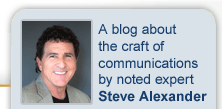Unconditional love: How can we practice it in our day-to-day lives?
I’m always amazed at how easy it is to be supportive, encouraging and complimentary to co-workers, colleagues and those that work for and with us every day. Offering a spontaneous, “Great job!” “Well done!” “Your work is showing real progress.” or “I was really impressed by how you handled that last challenge,” are words that are rewarding, when heartfelt and timely. So, why don’t we do it more ofen?
We don’t make the time. We don’t think of it. We’re too busy. And yet, an expression of support and gratitude in the workplace is just as valuable as those we experience in our personal lives.
Sometimes our co-workers seem caught up in their own issues, attitudes and challenges. This is when it takes an extra effort to remember a well-spoken, well-considered phrase can make all the difference in the world. One lesson I’ve learned is we never really know what’s going on with others who cross our paths at work. Sometimes folks get moody, testy, grumpy… you know the words that describe it. Reaching beyond our own moods and attitudes, and looking for that moment of unconditional love, pushes us to consider what might be going on in their lives that goes unspoken. Someone whose spouse is struggling with a life-threatening illness, maybe an argument at home that left an emotional tear, countless issues that make us all human, vulnerable and sometimes distracted in the workplace.
Looking for opportunities to practice unconditional love means acting in way that doesn’t seek the reward for your own behavior. Sure, you might see the response when you’ve taken the time to single out someone for extraordinary effort. That’s not the point; it’s not the doing of it for the sake of the result; it’s the doing of it because you’re doing the most loving and caring thing in the moment.
I once counseled a young couple to ask each other in the midst of their fighting, “What would love do in this circumstance?” They were surprised by the approach. In the midst of tension, at work or home, it’s the last thing we think of when instead we want to make our point, win our argument or ‘teach’ someone something. And yet the power of loving and caring in those moments can be profound and game-changing.
So, when you’re at work today, or for that matter, anywhere, look for the opportunity, seek out the spontaneous moment when unconditional love can be your game-changer. Look beyond your busyness, your own issues and priorities, and find that unconditionally loving moment; look beyond the words and outward impression, into the hearts of those around you. Share a thoughtful, caring and supportive moment. What happens next might be a surprise… not only to you, but as well to the lives of those you touch.




